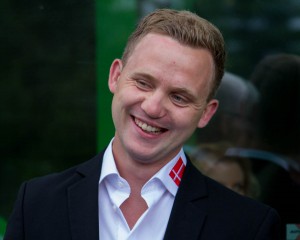 Dennis Bilde grew up on a farm in a deserted part of Denmark as the eldest son of two dedicated bridge players. As a child he spent hour after hour playing and learning bridge from his parents and uncle, all of them having performed on the Danish national teams. He became the second youngest ever to win the Vanderbilt, only narrowly surpassed by Bobby Levin back in 1980. However Dennis Bilde won the Vanderbilt having played every single board of the tournament, beating most of his childhood heroes on the way. His name still echoes through the bridge world and below you gain an insight as to how it feels facing and beating the best in the world to win the Vanderbilt at the age of 23.
Dennis Bilde grew up on a farm in a deserted part of Denmark as the eldest son of two dedicated bridge players. As a child he spent hour after hour playing and learning bridge from his parents and uncle, all of them having performed on the Danish national teams. He became the second youngest ever to win the Vanderbilt, only narrowly surpassed by Bobby Levin back in 1980. However Dennis Bilde won the Vanderbilt having played every single board of the tournament, beating most of his childhood heroes on the way. His name still echoes through the bridge world and below you gain an insight as to how it feels facing and beating the best in the world to win the Vanderbilt at the age of 23.
Winning the Vanderbilt (in Denmark now only referred to as the Vanderbilde) – ”We arrived late Sunday evening and did not know our seeding or if we were going to play the next day. Luckily we didn’t have to play until Tuesday, so we had a day to get ready. In our first match we played against four unknown Norwegians who turned out playing very well, so it was a tough match to start with. However as Roy Welland said, today all teams are so good that it is tough just getting to day 2 of the Vanderbilt compared to eight years ago. You have to play your best at all times, which to me is the greatest part about it.”
Round of 32 vs. #13 Berg (Lair, Bertens-Bakkeren, De Wijs-Muller) – “Already in the second match we faced the Dutch world champions Muller-De Wijs – Welcome to the Vanderbilt! We started out against them and tore them to pieces. The match never really got close and we won by about 80 imps. At this point I was excited, since I only played the Vanderbilt one time previously and lost in the first round to a strong team. I had looked at the draw and noted that if we made it to day 3, we would face Monaco.”
Round of 16 vs. Monaco #4 (Zimmermann-Multon, Helgemo-Helness, Fantoni-Nunes) – “I really wanted to play Monaco, since Helgemo and Helness is my favourite pair. They play bridge as I like to play, simple and good card play. It has been a dream to face them so I insisted on playing them in the first session. They started out in the strongest possible line-up with Helgemo-Helness against me and my father and Fantoni-Nunes against Roy and Sabine and I was convinced we were going to beat them.” Dennis says these words smiling without a hint of arrogance; simply a young man’s feeling of being unconquerable. “Not much happened in the first session, but still we were down by 35-5. Normally I don’t care about being down 30 imps, but I remember thinking during the second set that perhaps it wasn’t so good against this particular team… In the second set Multon and Zimmermann played well against us and Helgemo-Helness had decapitated Roy and Sabine. So now we were down by 80 and just needed to get away from that match and have a glass of wine for dinner. We were decided at beating them and now we were down by 80.“
3rd segment – “My father and I played against Zimmermann again and it was a very nice set with a good atmosphere. For some reason he seemed very happy… We won by 17 or 18 and were down by 67 and talked about giving up before the last 16 boards, but I just wanted to play and make sure we at least won the last set – and I wanted to play Helgemo and Helness and beat them. On the first board we got 1100 against Helgemo. I opened 1D and NV Helgemo held QJTxxx, Qxxx, x, xx and couldn’t bid 2S weak in their system, so he bid 3S. Not the right timing since my father held EKxxx of spades. All of a sudden it was a lot more fun to play that set.
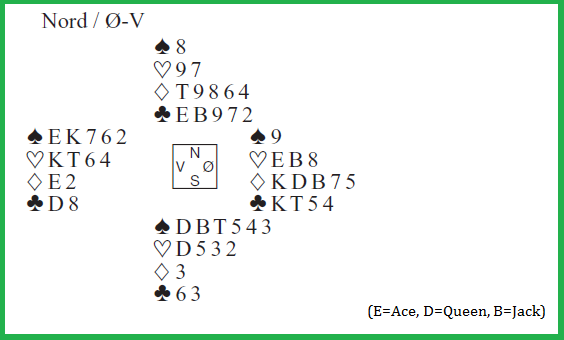
We could make 6NT, but not 6D, which was where Fantoni-Nunes had landed at the other table after Sabine opened a sporty 3C in North. So we won 15 imps on the first board and 15 again on the third board. Then we bid some tough games and made them all, doubled them a few times, when they went off and had a huge set. This was our quarter – and about time. As usual we finished half an hour before the other table and Helgemo-Helness estimated that had Sabine and Roy played well, they could potentially lose 56 imps on the set. I was just happy that we had beaten Helgemo and Helness. Sabine and Roy came and Roy said “We might have some good boards.” Normally Roy says “We might have some bad results.” We compared and won by 71-10 – we counted eagerly, but it wasn’t enough, and we lost by 4 imps.” However Roy and Sabine had an appeal against Helness and Helgemo from the second set that could potentially change the outcome of the match. Dennis went to bed not knowing if he was going to play the following day and woke up in the quarterfinal of the Vanderbilt.
Quarterfinal vs. Amoils’ reigning champions #5 (Gitelman, Grue-Moss, Bessis-Bertheau) – “Now we faced Amoils with Joe Grue and the gang. A great team to play, but having just beaten Monaco we were invincible and not scared of anyone. We were up by 52 before the last 16 boards and faced Grue-Moss. The first five boards were good for us, but they are not exactly known for sitting on their hands, so they just rolled out their swing style and got a lot of good punches in. They went down in a 25 % slam with a few boards to go and I remember thinking that now we had won the match, and I just wanted to get out, compare and go celebrate. Then I got sloppy in a defence by not giving correct count in an essential moment and they made 3NT. I thought to myself “What the… Can we lose now?” We played the last boards with a small plus and won by 16. The match was a little less uptight than the Monaco-match since we were up by a little all the way although last session was nerve wrecking.”
How much do you think about the score while you play?
“I am very focused on not thinking that we have won. I did it on that board. It is a common mistake, and you cannot do that against such class players as Grue and Moss. And Bessis and Bertheau were sitting at the other table against Roy and Sabine. I believe you always have to play as if the match just started and not become passive, since then you might lose it all against aggressive players who create swings. You have to play tough all the way.”
Semifinal against Rosenthal #1 (#9) (Silverstein, Fallenius-Fredin and Nyström-Upmark) – “In the semifinal I had hoped we would face Nickell because I wanted to beat both Nickell and Monaco in the same tournament. However they lost to the Swedes so now we had to face the Rosenthal team with Fredin-Fallenius and Nyström-Upmark whom we know well.” (As neighbour countries, Swedes and Danes are generally close friends and fierce competitors). “Up until this point there had been several tables in the playing room. Now there was just our table. It felt like playing a football match on an empty Wembley Stadium. After the first set we were down a little. I like to play against the good pairs and in the second set we played against Fredin-Fallenius. When you meet players like them you cannot expect to win every board. Fredin played a 3NT in a Fredin-like manner that we could beat, but didn’t. It turned out to be plus one imp. 🙂 The rest of the quarter we just beat them. Third set was also good for us and going into the final 16 we were up by 46.”
Did you think about how close you were to the final during the play?
“It is impossible not to think about. I try to think that it is so much cooler to be up than down, but still fight for the victory. So we did. In the last set we were about tied at our table and Sabine and Roy had a nice set, so that match never got really close. It was great to beat them since it would have been embarrassing coming home to Denmark having lost to Sweden…” “Now we were in the final. It was crazy. From home I had thought to myself that this would be a good tournament to do well in, but I had never imagined this. Reality exceeded all of my dreams.”
Vanderbilt Final vs. van Prooijen #6 (the reigning Dutch world champions Ricco van Prooijen-Louk Verhees, Sjoert Brink-Bas Drijver and Bermuda Bowl runner ups Dan Zagorin-Kevin Bathurst) – “This time we faced a team who had won all their matches by at least 90 imps. So we were underdogs – again. 🙂 We started against Brink-Drijver and I played badly. I started out going for 500 in a phantom save where I could have escaped for 300. Perhaps an indication that it had been a long tournament. I thought to myself “It’s just one board out of 64.” Roy and Sabine had a good set so we were tied after the first quarter. In the second set we played against Verhees-van Prooijen. They are different from Brink-Drijver who joke a lot at the table. Verhees-van Prooijen are more thoughtful, so I said to myself “Those two we are gonna beat”.”
How come?
“When I sit down against the focused, thoughtful players I am thinking “you just come on”. They simply don’t seem as intimidating. Even though they think a lot, what they do seems very straight forward. There is not a lot of action so even though they are good players, I feel like I know where I have them. We had a great set so it went as I expected. We were up by 30 imps halfway in the final of the Vanderbilt. “
Interlude
“There is a 2 hour dinner break between the second and third quarter. It never felt as long as this day. I went to the room to sleep a bit but couldn’t rest at all. I was actually nervous, since I had never been in such a situation before. I went for a walk, moved around a bit, gave myself a pep talk. Now we were going to face their strongest line up. We had the seating rights and chose to play against Verhees-van Prooijen who we had done well against. It was a wild and well played set with lots of slams. Van Prooijen played a 4S contract very well. I don’t even know the name of that coup. It was probably one of the coolest plays I have witnessed. It was beautiful bridge that deservedly earned him 10 imps.”
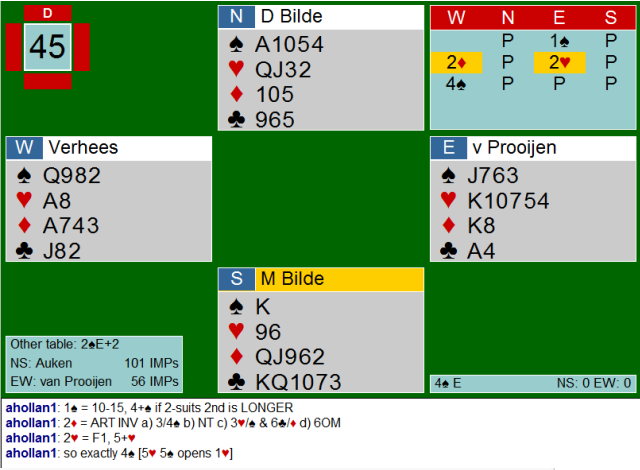
Morten Bilde led the king of clubs. Van Prooijen took the ace and continued with a club towards the jack, won by South’s queen. Now Morten Bilde switched to the DQ, taken in hand by the king. Van Prooijen played a diamond to the ace and pitched a heart on the jack of clubs. He ruffed a diamond, Dennis pitching a heart in north. Now East played HK, heart to the ace, 7 of diamonds ruffed with the 6 of spades, North pitching his last heart. Now he played a heart to the SQ! North left with only spades underruffing with the 4. Now declarer played the S2 to the 7 and South’s king who could only play a club, letting van Prooijen in East score the SJ en passant. “We lost the set by 11 imps and were up by 22 going into the last quarter. We played against Sjoert and Bas. They started out better than us.” (At this stage the score in the match was 104-93 in favour of Auken) “Then came a board where I held KT83, 94, QJ6, Q542. My father opened 1NT 15-17. We play a system where I cannot bid stayman without forcing to game, so I had to decide and went for the game, though Brink and Drijver hadn’t given any tricks away on defence so far. “
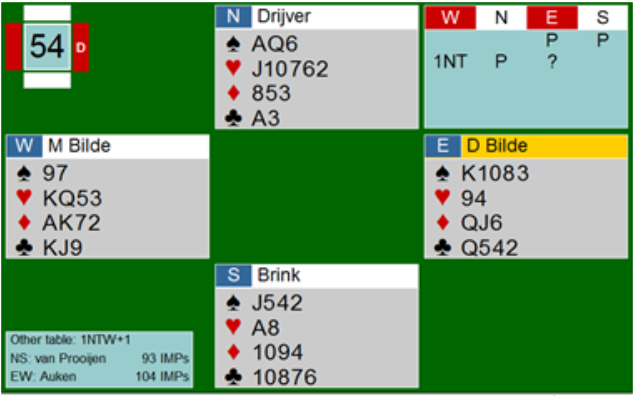
When Dennis put down dummy, Brink teasingly asked him “Do you invite with 5-7?” Drijver led the 2 of hearts to South’s ace and a heart back. Bilde senior in west now played the jack of clubs, taken by North’s ace to return another heart. After seeing hearts split 5-2, declarer entered dummy to finesse the club 9 for his ninth trick and vulnerable game (the other table played 2NT making). “After that board we were back on top and Bas sat for a while shaking his head. Then they bid and made a slam and we went down in slam after Sjoert finding the right lead.“ Your partner opens 1NT 10-12 first seat NV. Next hand overcalls 2H vulnerable. The opponents bid to 6H: 1NT (2H-4C (fitbid), 4H-4NT, 5H-6H) Now you have to lead from your Yarborough: 642, 9853, 94, 9643. Your lead? Brink led the 9 of diamonds, the only lead to beat the slam. “With 5 boards to go a board with competitive bidding came up, they were in 3S and I had a feeling that if I bid 4H Bas in North would bid 4S and then I would double. My prediction was right, but when he bid 4S I somehow changed my mind and decided to just let it pass… I think my nerves puzzled me for a second.
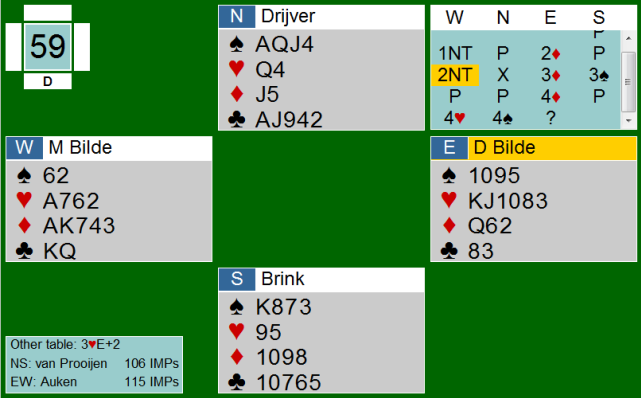
Now my father thought my pass might be forcing and went on to 5H with his good hand. We got doubled and went for 300 rather than the other way around.” Having led since the second quarter, Dennis’ team was down by 2 imps with 4 boards to go. They scored an imp on the next board, the score now being 117-116. On the penultimate board Roy Welland and Sabine Auken had a great result having bid and made 3NT, Brink and Drijver going down one in 3C worth 12 imps. On the very last board of the 64-board final NS could potentially bid 6S, which, if made, would tie the match. However Dennis’ old man made the first move by pre empting 4C first seat vulnerable with T94, K, 2, KJT98743. Two passes and a D by Brink in 4th seat. Now the bridge world held it’s breath with the spotlight on Drijver who NV held A652, Q7, J96, A652 facing his vulnerable opponents. If he bid 4S, Brink would probably go for the slam, given the stage of the match. “Bas almost threw his cards on the table and shook his head, because he knew that his call could be deciding the match. He knew the right call was to pass, having two aces and his partner doubled in fourth seat. He passed, eventually chose the wrong lead and the contract went down 1 for -200.” “Bas and Sjoert had a bad feeling and as we exited the room, Sabine was standing outside smiling. We compared and had won by 17. It was amazing. It was more than I dared to dream of. Sabine could not believe it. We were all in raptures. Everybody came to congratulate us, took pictures, we were handed the Vanderbilt trophy. Afterwards we went down to the bar, where everybody had been following the play. I came from the outside, didn’t know that many people at the nationals, and all of a sudden we were the centre of attention. Talking to everybody, having a glass of champagne and a beer, had to remember to celebrate, “Do you have a good hand?”, “I don’t know, I don’t remember”. It was completely overwhelming. I remember there was a fire at our hotel so we had to gather almost immediately after we had won. I think no one has ever looked so happy having just been told there was a fire at their hotel. “
Which match in the Vanderbilt was your favourite?
“The final, but only because it was the final. The four last matches were all unique in each their way. The final and the match against Monaco, because it has been a dream for me to play against Geir and Tor. “
You won the junior world championship in 2008 only 18 years old. Which is your greatest bridge moment?
“It was awesome winning the junior WC, but winning the Vanderbilt is bridge at another level. The whole world has reacted to this and people from everywhere have congratulated us. During the following week I realised how big this is. For me the strongest reaction was that someone said that this is the greatest thing that ever happened to bridge in Denmark. For me personally it was just as great winning the junior WC. But by winning the Vanderbilt I have beaten all the players I read about when I was younger – plus I got to play all the boards…“
How does your future look now?
“My father and I are playing with Paul Street and Barnet Shenkin for the next cycle of the Nationals. After that nothing is certain yet. My dream is to play regularly at the American Nationals and Regionals and make a living as a professional bridge player.”
What will you become if not a bridge professional?
“I will be. There is nothing else for me. I have no plan B.”
***
Christina Lund Madsen